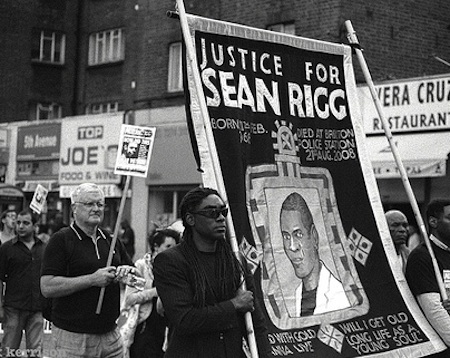Race is ‘significant contributory factor’ to deaths in police custody, according to independent review
The long awaited independent review into deaths in custody has found ethnicity to be a ‘significant contributory factor’ in relation to fatalities. The wide-ranging report calls for reform of the police watchdog the Independent Police Complains Commission including the ‘phasing out’ of ex-police officers leading investigations; an end to the conferring between officers before they make statements; and legal aid for families whose relatives have died in custody. Sarah Foss reports
Since 1990, 1,563 people have died in police custody with a third of these being from a BAME background. Dame Elish Angiolini, the author of the report, claimed BAME individuals were over-represented both in figures of those restrained and deaths after its use.
Prime Minister Theresa May commissioned the report while Home Secretary in July 2015 following her meeting with the families of Sean Rigg and Olaseni Lewis. The much anticipated document called for ‘all due consideration’ to be given to the possibility of race playing a part in deaths in custody.
Dame Angiolini recommended the IPCC consider race and discrimination issues as ‘an integral part of its work’. She also urged national policing bodies to adopt compulsory training which would include bereaved families and examine the social context of Black deaths in custody.
As well as calling for the provision of legal aid to relatives of those who have died in custody, the review further stated that people with mental health concerns had a higher likelihood to die following the use of force. Angiolini cited a 2015 Home Affairs Committee Report which found that the shrinking of mental health services had turned the police into a ‘service of last resort’.
The report said that for the state to fulfil its legal obligations to allow families to participate in the process that is ‘meaningful and not “empty and rhetorical”’ there should be access to ‘free, non-means tested legal advice, assistance and representation immediately following the death and throughout the Inquest hearing’.
Deborah Coles, director of INQUEST, a charity that investigates deaths in custody called the report a ‘blueprint for change that would benefit everyone.’ But also noted that its value ‘must ultimately be judged by the changes it brings about.’
Clair Hilder, a solicitor at Hodge Jones & Allen, said that the ‘huge number of recommendations made by the report, 110 in total’ revealed ‘the scale of the task ahead’. ‘It’s important that this opportunity is taken,’ she said. ‘Yet, coming at a time when police chiefs are warning of a ‘perfect storm’ due to staff shortages and budget cuts, I hope the Angiolini report will not face the same fate as frequent previous reports looking at deaths in state detention, including the 2015 Harris Review on self-inflicted deaths of young people in prison, which saw the government reject 30 of its recommendations.’
MAIN FINDINGS
- To ensure the independence of the IPCC, ex–police officers should be phased out as lead investigators;
- There should be ‘a fundamental change’ in how the IPCC investigate, supervise and resource cases and a specialist deaths and serious injuries unit set up to address ‘delay and problems with the quality of investigation’ staffed by ‘senior and expert officers from a non-police background’;
- IPCC should have an experienced officer to attend ‘as a matter of urgency at the scene’;
- National policing policy must reflect the ‘now widely evident position that the use of force and restraint against anyone in mental health crisis or suffering from some form of drug or substance induced psychosis poses a life threatening risk’;
- Officers involved in a death in custody or serious incident ‘should not confer or speak to each other’ following the incident and prior to producing their initial accounts and statements;
- It is ‘critical’ for the IPCC, CPS and HSE to meet very early following a death in police custody to review the emerging evidence, and take an early view as to whether criminal charges might be a possibility;
- There is a need for properly funded specialist bereavement counselling to be offered to families from the outset;
- For the state to fulfil its legal obligations of allowing effective participation of families in the process that is meaningful ‘and not “empty and rhetorical” there should be access for the immediate family to free, non-means tested legal advice, assistance and representation immediately following the death and throughout the Inquest hearing’; and
- The use of police custody for children detained under section 136 of the Mental Health Act 1983 should be brought to an end with all NHS Trusts required to make sufficient provision of health-based places of safety to meet this requirement.
This article was first published October 31 2017






